|
November 27, 2012 - Vol. 2
No. 10
No to Austerity! Repeal Putting
Students First Act!
Oppose Use of Ministerial Veto
to Impose Austerity Agenda
|
Mass Rally at
Ministry of Finance
All
Out to Fight
Government’s Attack on
Bargaining and Arbitration!

Wednesday,
November
28
--
12:00
noon
7 Grosvenor St, Toronto
To download poster, click here.
Organized by:
CUPE Ontario and Ontario Council of Hospital Unions
Buses
departing from across the province -- contact CUPE for
information:
Misty Gagne, mgagne@cupe.on.ca, 905-739-9739 x 614
|
|
No
to Austerity! Repeal Putting Students First Act!
• Oppose Use of Ministerial Veto to Impose
Austerity Agenda - Enver Villamizar
• York Region High School Teachers to Vote on
Tentative Agreement; More Elementary Teachers Commence Strike Actions
Opposition to Putting
Students First Act Continues to Grow
• Spirited Actions Around the Province
• Canadian Union of Public Employees Holds Mass
Membership Meetings
Liberal Schemes to
Privatize Education
• McGuinty Government's Further Moves Toward
Private Delivery of Public Education
- Laura Chesnik
No to Austerity! Repeal Putting Students
First Act!
Oppose Use of Ministerial Veto
to Impose Austerity Agenda
- Enver Villamizar -
Votes are taking place this week on the non-freely
negotiated tentative agreements arrived at between the Ontario
Secondary School Teacher's Federation (OSSTF) and the York Region
District School Board, with others to follow across the province. The
tentative agreement signed with the York Region District
School Board and OSSTF was submitted to the Minister of Education by
the school board prior to it being finalized for submission to the
teacher bargaining unit for ratification. Under the Putting
Students First Act all agreements negotiated between school boards
and unions must be submitted to the
Minister for approval. It is reported that the OSSTF agreements were
submitted to the Minister before ratification in order to ensure school
boards that they were not
going
to defy Bill 115 which contains the requirement for "restrainst
measures" to remove $2.19
billion from education.
 Even if the tentative
agreement is ratified by the
members of OSSTF it must once again be formally approved by the
Minister for it to take effect. It is important to consider, that with
the arbitrary powers contained in the Putting
Students
First Act, during the period of restraint a
Minister-approved collective agreement could even be changed and a new
one imposed by the Lieutenant Governor in Council on behalf of the
Minister of Education Even if the tentative
agreement is ratified by the
members of OSSTF it must once again be formally approved by the
Minister for it to take effect. It is important to consider, that with
the arbitrary powers contained in the Putting
Students
First Act, during the period of restraint a
Minister-approved collective agreement could even be changed and a new
one imposed by the Lieutenant Governor in Council on behalf of the
Minister of Education
In response to the submission for approval, Minister
Broten stated: "Congratulations to the leadership at both school boards
and OSSTF local unions for their focus on finding a pathway forward
that meets our fiscal parameters while protecting full-day
kindergarten, small class sizes, and teaching jobs.
"These tentative agreements show what's possible when we
continue to work with our partners to find solutions that put students
first.
"It is important to point out that, under the Putting
Students
First
Act, until the agreements are ratified by the local
union membership we will not be able to officially approve them. In
advance of any ratification votes, we are seeking points of
clarification to further understand the agreements and
are working closely with the parties. We have found the process of
receiving draft agreements in advance of ratification very useful and
hope to use this process for agreements moving forward." (OPF
emphasis.)
The workers opposition should consider why the
government is trying to bring in these new arrangements for labour
relations that place the Minister in a position to approve or
disapprove tentative collective agreements. The attempts to make
permanent an arbitrary ministerial prerogative is also in line with the
Hudak
PCs' White Paper which calls for ministerial appointment of arbitrators
in interest arbitration for collective agreements with workers who
provide what are deemed "essential services." If ministerial approval
is required for all future tentative agreements before they are
submitted to members for approval it makes a mockery of the decision
making
authority
of the members of a union to decide their wages and working conditions
and to negotiate with school boards. Such an arrangement cannot be
accepted.
Ministerial veto power over an agreement negotiated
between teachers' unions and school boards is an attack on the right of
unions and their members, as well as locally elected school boards to
play a role in deciding what happens in public education. In this
arrangement, the government presents itself as the
defender of the public interest against allegedly self-serving unions
and irresponsible school
boards. This gratuitous attack on unions and school boards is not only
irresponsible but self-serving since its sole aim is to take money out
of the system to pay the rich under the banner of austerity. The
government
is interfering in order to guarantee the imposition of the austerity
agenda demanded by the rich, not to guarantee the quality of the
education system that Ontario requires. Teachers
and education workers are defending the public interest, and it is the
Minister's dictate that is against the public interest.
 Whether these new tentative
agreements are "better or
worse" than the agreement signed by the Ontario English Catholic
Teachers Association (OECTA) should not divert from the essential
question of what new arrangements the
government is trying to make permanent so as to undermine the ability
of teachers and education workers to resist
the austerity agenda today and in the future. Whether these new tentative
agreements are "better or
worse" than the agreement signed by the Ontario English Catholic
Teachers Association (OECTA) should not divert from the essential
question of what new arrangements the
government is trying to make permanent so as to undermine the ability
of teachers and education workers to resist
the austerity agenda today and in the future.
Having the Minister usurp decision making authority from
union members and from locally elected school boards is not a measure
aimed at "protecting gains in the classroom" as the government claims.
It is a measure to lay the ground for future cuts to funding for
education and those who provide it and to bring
in other anti-social arrangements, such as the private delivery of
public education, an area of large public expenditure that the
monopolies would love to get their hands on. It must not pass!

York Region High School Teachers to
Vote on Tentative Agreement;
More Elementary Teachers Commence Strike Actions
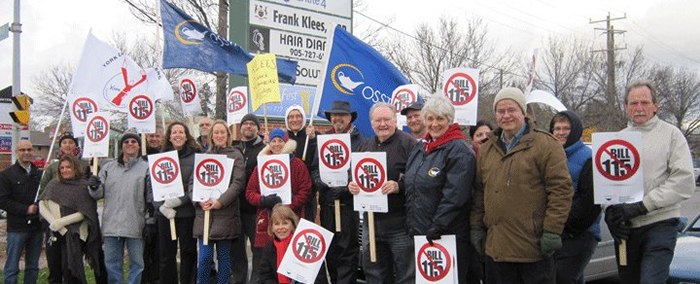 York Region high school
teachers in action to oppose Bill 115, at the constituency office of
Frank Klees,
York Region high school
teachers in action to oppose Bill 115, at the constituency office of
Frank Klees,
MPP for Newmarket-Aurora, November 2, 2012. (OSSTF District 16)
On Monday November 26 an information meeting was held
for York Region secondary teachers and occasional teachers about the
tentative agreement reached between the Ontario Secondary School
Teachers' Federation (OSSTF) and the York Region District School Board
negotiators. On November 27 a bargaining unit
ratification vote will take place.
The vote will no doubt set the tone for what will take
place in other locals and has deep ramifications. OSSTF members across
the province are trying to sort out how best to oppose the government's
dictate contained in Bill 115 and are watching what takes place in
York. Teachers and education workers are
arguing out how best to do this in the context of the tentative
agreements. A letter issued by some members of the OSSTF local is
making the rounds on social media and expresses the concerns they have
with the tentative agreement and calls on members to vote against it as
a vote against Bill 115. The letter states:
"We have nothing to lose if we fight bill 115... voting YES is a loss
starting this year. If we don't fight to repeal Bill 115 now, it's not
going away... It stays in place for the next 'negotiated agreement' 2
years from now, and so on. It's a bill and it doesn't have a firm
expiry date. 90% of us voted to strike a while
back... 90% of us need to vote NO to ratification!!!"
OSSTF bargaining units in other Districts who have
tentative agreements with their Boards of Education that have also been
"pre-approved" by the Minister of Education are expected to follow the
York vote with information meetings and ratification votes of their
own. If any such "pre-approved" tentative agreement
is ratified by both parties it must be sent back to the Minister for
final review and approval in keeping with protocols established under
the Putting Students First Act. As of November 23, fourteen
tentative agreements had been reported between OSSTF bargaining units
and Boards of Education.
On Monday November 26 1,340 elementary teachers at the
Kawartha Pine Ridge and 1,111 at the Lakelands District School Boards
commenced work-to-rule sanctions, joining 5,000 of their
counterparts in York Region and 134 in Rainy River who began similar
actions last week. Other locals of the Elementary
Teachers' Federation of Ontario will start working-to-rule as they
reach legal strike positions in the coming days.

Opposition to Putting Students First Act
Continues to Grow
Spirited Actions Around the Province
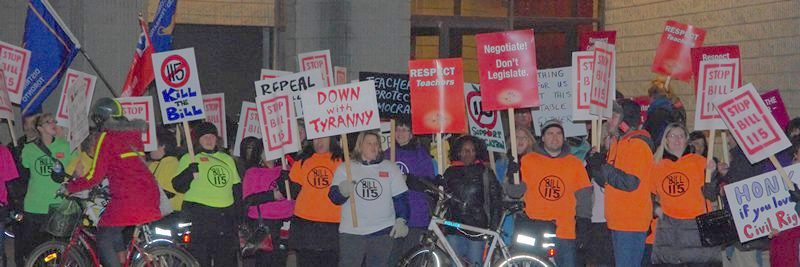 Protest at Liberal Party
fundraiser in Toronto, November 20, 2012.
Protest at Liberal Party
fundraiser in Toronto, November 20, 2012.
Hundreds of teachers and education workers from all over
the Greater Toronto Area (GTA) participated in a militant demonstration
in downtown Toronto on November 20 to demand the repeal of Bill 115,
the Putting Students First Act. The action took place outside
the Westin Harbour Castle hotel
where the Ontario Liberal Party was holding a fundraising dinner in
honour of Party organizer Greg Sorbara who retired as MPP for Vaughan
in August.
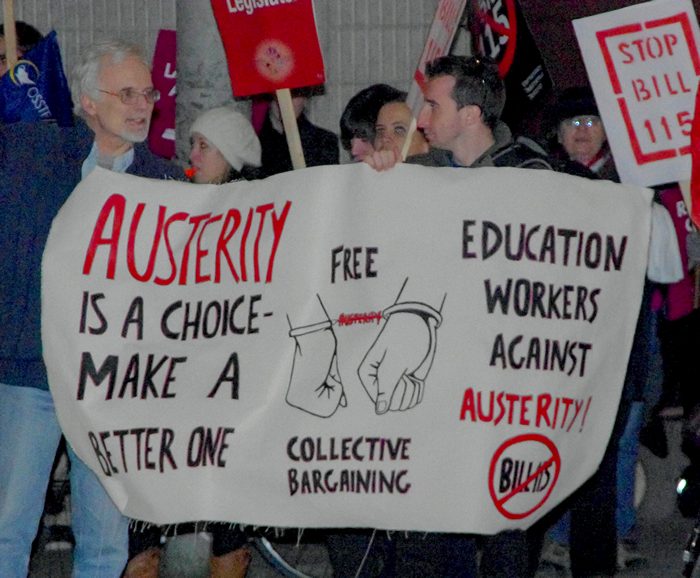 Teachers from schools all
over the city and the GTA
arrived at the rally in busloads, including busses from Durham Region,
York Region and Peel Region. More than 300 teachers, education workers
and parent/student supporters participated in the action. Their aim was
to confront the Liberal Party, including
the Liberal leadership race candidates, with the demand to repeal Bill
115. "Kill the Bill! Kill the Bill!" echoed through the downtown
streets as the Liberal Party elite and their rich supporters headed
into the Harbour Castle for their $750 a plate dinner. Teachers from schools all
over the city and the GTA
arrived at the rally in busloads, including busses from Durham Region,
York Region and Peel Region. More than 300 teachers, education workers
and parent/student supporters participated in the action. Their aim was
to confront the Liberal Party, including
the Liberal leadership race candidates, with the demand to repeal Bill
115. "Kill the Bill! Kill the Bill!" echoed through the downtown
streets as the Liberal Party elite and their rich supporters headed
into the Harbour Castle for their $750 a plate dinner.
The action was organized by the Elementary Teachers of
Toronto (ETT), one of the union locals of the Elementary Teachers
Federation of Ontario (ETFO). The demonstration was supported by the
other ETFO units and the provincial body. Members of Ontario Secondary
School Teachers Federation (OSSTF) District
12 and members of Canadian Union of Public Employees (CUPE) Local 4400
also participated.
On their way into the fundraiser, supporters of some of
the so-called moderates running for the Liberal leadership tried to
engage the
protesters to promote their candidates as friends of teachers. But they
were soundly rejected by the teachers who called the so-called
moderates to account, "Did Kathleen Wynne vote for
Bill 115? Did Eric Hoskins vote for Bill 115?" they asked.
Other Actions
There were also marches and rallies outside
MPPs'
offices in other places including Kingston, Windsor, Ajax, Rockland and
Brantford during the past week. Pictured above, protests at Kingston
constituency office of MPP and Attorney General John Gerretsen (left)
and at Windsor constituency office of Finance Minister Dwight Duncan,
November 23, 2012.
 Windsor public forum,
November 20, 2012, to discuss the significance of Bill 115 and the
importance of everyone
Windsor public forum,
November 20, 2012, to discuss the significance of Bill 115 and the
importance of everyone
joining in the fight for its repeal. A similar
event was held in Hamilton, November 21, 2012. 
Canadian Union of Public Employees Holds
Mass
Membership Meetings
 Peterborough
Peterborough
Throughout last week, the Canadian Union of Public
Employees (CUPE) Ontario held mass membership meetings in Kingston,
Pembroke, Peterborough, Mississauga, Hamilton and Windsor as part of
a growing province-wide campaign against Bill 115 and in defence of the
right to collective bargaining for all
public sector workers. More of these meetings will be held in the
coming week. A listing of events can be found on the CUPE website.
 A report on the Hamilton
meeting on the CUPE Ontario
website informed that members "packed the Steelworkers Hall on Barton
Street to say 'No' to government plans to remove democratic rights, and
vowed to stand together against existing legislation, Bill 115, which
already does this in school boards. With
people standing in the aisles, the union launched the region's part in
a province-wide campaign to protect workers' democratic rights to
collective bargaining and impartial contract arbitration." A report on the Hamilton
meeting on the CUPE Ontario
website informed that members "packed the Steelworkers Hall on Barton
Street to say 'No' to government plans to remove democratic rights, and
vowed to stand together against existing legislation, Bill 115, which
already does this in school boards. With
people standing in the aisles, the union launched the region's part in
a province-wide campaign to protect workers' democratic rights to
collective bargaining and impartial contract arbitration."
CUPE's report noted that "the crowd included many school
board workers, who yesterday, delivered a province-wide strike mandate
of 88 percent, as well as significant numbers of health care and social
service workers, municipal workers and workers at the university who
are concerned about future legislative
attacks. Much of the evening was spent brainstorming local campaign
activities meant to raise public awareness about the importance of
protecting collective bargaining and third-party arbitration rights."
The Windsor meeting was attended by CUPE members from a
broad variety of public service sectors in the city including City
inside and outside workers, day care workers, Children's Aid workers
and University of Windsor support staff.
 Hamilton
Hamilton
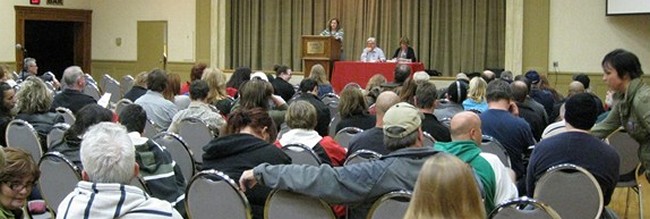 Windsor
Windsor
More Boards Call for Repeal of Bill
115
In related news, according to reports on November 28
trustees of the
Simcoe District School Board will vote on a motion calling for the
repeal of Bill 115 and on December 17 the Hamilton-Wentworth
Board will be voting on a motion to repeal
or review the Bill, similar to motions passed by the Ottawa Carleton
and Bluewater District Boards. It was also reported that the Thames
Valley District Board has passed a "formal
and urgent request to rescind the legislation" and that the Ontario
Public School Boards Association has taken a similar stance.

Liberal Schemes to Privatize Education
McGuinty Government's Further Moves Toward
Private
Delivery of Public Education
- Laura Chesnik -
In 2003, the Liberal Party
under the leadership of
Dalton McGuinty, was elected in Ontario. Their election followed eight
years of the Harris Conservative government and the anti-social
offensive that the Harris regime wrought on public services, all in the
name of paying down the debt and deficit. The media
pronounced McGuinty as the "Education Premier"; claiming he would
restore the place of public education and that of education workers in
Ontario after years of attack and slander. Today the case is being made
that in the early years of his government, McGuinty was good for
education but that now he and his
government have lost their way. A review of the overall direction the
Ontario government has taken since 2003 shows that the tactics the
McGuinty government has taken then and now may appear to be different
but, in the name of "protecting the classroom," the anti-social
direction has been the same.
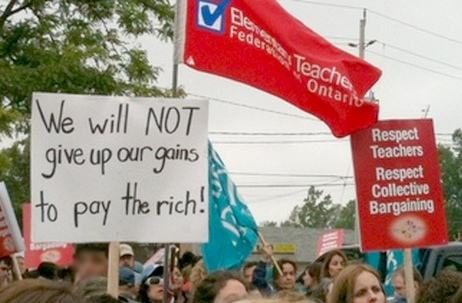 In December 2005, when
current Ontario Liberal
leadership candidate Gerard Kennedy was Minister of Education, the
McGuinty government introduced Bill 52: "an Act to amend the
Education Act respecting pupil learning to the age of 18 and equivalent
learning and to make complementary amendments
to the Highway Traffic Act." The stated aim of the bill was to
address Ontario's low high school graduation rate of 68 per cent. Bill
52
allowed for the denial or suspension of a person's driver's licence if
they are under 18 and "...unable to prove their regular attendance at
school or in a recognized learning program..."
Along with the provision to punish students for social problems found
in the Highway Traffic Act, amendments to the Education
Act were made to offer "equivalent learning opportunities" for
Ontario students under the guise of meeting the needs of non-graduating
students. In December 2005, when
current Ontario Liberal
leadership candidate Gerard Kennedy was Minister of Education, the
McGuinty government introduced Bill 52: "an Act to amend the
Education Act respecting pupil learning to the age of 18 and equivalent
learning and to make complementary amendments
to the Highway Traffic Act." The stated aim of the bill was to
address Ontario's low high school graduation rate of 68 per cent. Bill
52
allowed for the denial or suspension of a person's driver's licence if
they are under 18 and "...unable to prove their regular attendance at
school or in a recognized learning program..."
Along with the provision to punish students for social problems found
in the Highway Traffic Act, amendments to the Education
Act were made to offer "equivalent learning opportunities" for
Ontario students under the guise of meeting the needs of non-graduating
students.
According to the Act, equivalent learning is "a
learning situation that falls outside the instruction traditionally
provided by a board" where the Minister of Education approves
"one or more groups, organizations or entities [...] to provide
equivalent learning."

The amendments put in place by the McGuinty government
stipulate that the Minister of Education may:
"establish policies, guidelines and standards with
respect to equivalent learning and may,
"i. require that boards develop and offer equivalent
learning opportunities to their pupils in accordance with the policies,
guidelines or standards,
"ii. subject to subsection (2), in accordance with
criteria set out in the policies, guidelines or standards, designate
groups, organizations or entities that are approved to provide
equivalent learning to pupils of a board,
"iii. in accordance with criteria set out in the
policies, guidelines or standards, designate programs, courses of study
or other activities that are approved for the purposes of equivalent
learning"
Aims of Equivalent Learning
Ontario teachers have been advocating for ways to
increase resources in education so they can provide "equivalent
learning opportunities" for students such as: field trips, camps and
other "learning situation[s] that fall outside the instruction
traditionally provided by
a board." The aim of the amendments to the Education Act by the
McGuinty government in 2006 however, were not to increase resources to
the public education system. Whose interests are served by these
amendments? Whose agenda is being put forward by the McGuinty
government?
The amendments laid out in Bill 52 should be
viewed in
the context of other amendments to the Education Act, such as
where boards are subject to provincial takeover based on student
achievement outcomes, "in-year deficit," or reasonable grounds to
believe there would be an "in-year deficit."[1]
By implementing "equivalent learning
opportunities" while not increasing funding for public education, the
door is opened for public-private partnerships in public
education -- and the stage is set for the private for profit delivery
of
publically financed education all under the control of the Minister
of Education.
 Bill 52 moved to Second Reading in the spring of
2006,
with Sandra Pupatello as Education Minister and Kathleen Wynne as her
Parliamentary Assistant. (Wynne took over as Minister of Education in
September 2006). Both Pupatello and Wynne are current Liberal
leadership candidates. In presenting the legislation
at Second Reading Pupatello stated: "The legislation, if passed, would
allow school boards to provide learning opportunities to their students
in partnership with community groups, the business community, training
centres, colleges, universities and other organizations that provide
programming for young people. Both
school boards and I, as Minister of Education, would be able to enter
into agreements with these groups so students can more easily
participate in non-traditional educational experiences. I, as Minister
of Education, would set criteria and standards for all non-traditional
educational experiences."[2] Bill 52 moved to Second Reading in the spring of
2006,
with Sandra Pupatello as Education Minister and Kathleen Wynne as her
Parliamentary Assistant. (Wynne took over as Minister of Education in
September 2006). Both Pupatello and Wynne are current Liberal
leadership candidates. In presenting the legislation
at Second Reading Pupatello stated: "The legislation, if passed, would
allow school boards to provide learning opportunities to their students
in partnership with community groups, the business community, training
centres, colleges, universities and other organizations that provide
programming for young people. Both
school boards and I, as Minister of Education, would be able to enter
into agreements with these groups so students can more easily
participate in non-traditional educational experiences. I, as Minister
of Education, would set criteria and standards for all non-traditional
educational experiences."[2]
Educators' Concerns About Bill 52
In response to Bill 52's introduction, the Ontario
Secondary School Teachers' Federation (OSSTF) raised concerns about the
aims of the amendments and what these might mean in terms of
privatization. OSSTF stated: "The Ministry [of Education] wants to
expand
the number of agencies that grant external credits. They are planning
to set policy that would establish standards to approve various
organizations to provide credits for equivalent learning. They
recognize that by opening the door to external credits they will get
applications from a number of institutions including
private colleges, private universities, faith-based institutions and
private industry and while not necessarily prohibiting these
applications, they want to set the standards themselves to maintain
control. Once the registry is established it would allow school
administrators and the broader public to have access."
"[... The Ministry of Education] anticipate[s] that
the first year roll-out [of equivalent learning in 2006] would be more
or less voluntary. In 2008, however, participation by all boards would
be required."
At the time, the Ontario Teachers' Federation (OTF) --
the organization that represents all teachers in Ontario's publicly
funded schools -- also raised concerns, stating that the definition for
equivalent learning is "extremely vague" and that "[t]he process for
obtaining Ministry approval [to offer equivalent learning
credits] should be more than a requirement to obtain a business licence.
"Another concern of the teachers of Ontario in this
section of the bill is the silence on accreditation or standards for
those who would deliver these equivalent learning programs."
The Ontario Principals' Council -- a voluntary
organization made up of principals and vice-principals from publicly
funded school boards or government agencies funded by a Ministry --
stated: "...we are pleased to see the concept of equivalent learning as
outlined in the Bill. Encouraging students to take part
in programs offered by universities and colleges, schools of music and
art, apprenticeships, skills training and workplace opportunities is
consistent with our belief that all students should be offered
opportunities to access learning opportunities that meet their own
needs."
The Ontario College of Teachers -- the professional
organization that all teachers who teach in Ontario's publicly funded
schools are members of and a creation of the Harris government in 1997
-- stated at the time: "[w]hile the College supports the intent of the
legislation to encourage students to remain in school,
it is concerned that the Bill, if passed in its current form, would
have a significant impact on the College's ability to fulfill its
statutory mandate to protect the public interest in providing safe
learning environments."
"[... T]he amendments proposed under Bill 52 offer no
guarantees that equivalent learning opportunities will be supervised by
teachers who are members of the College with specialized knowledge and
subject to our disciplinary oversight. Further, the Bill provides no
mechanism by which to assess and monitor
equivalent learning providers or the learning opportunities they
provide.
"As a result, the College's commitment to ensure that
publicly funded education in this province is delivered by qualified
teachers would be compromised."
Time has certainly vindicated these predictions. Now the
government is taking more steps to destroy the right to education by
defunding the public system and depriving teachers and education
workers of the ability to affirm their rights.
Notes
1. See Ontario Political Forum,
July 26, 2012 - No. 42.
2. Legislature of Ontario Hansard,
May
31,
2006.

PREVIOUS
ISSUES | HOME
Read Ontario Political Forum
Website: www.cpcml.ca
Email: ontario@cpcml.ca
|

